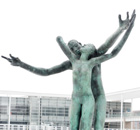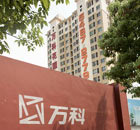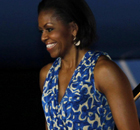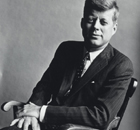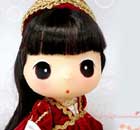Foreign and Military Affairs
President Hu offers nuclear security support
By Wu Jiao, Tan Yingzi and Li Xiaokun (China Daily)
Updated: 2010-04-14 07:13
 |
Large Medium Small |
WASHINGTON - President Hu Jintao has offered nuclear security assistance to developing countries as he called for concerted international efforts to address the issue.
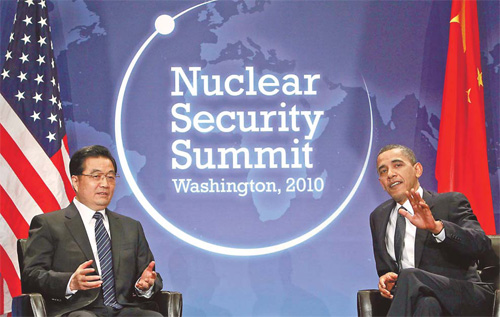 President Hu Jintao meets US President Barack Obama on the sidelines of the Nuclear Security Summit in Washington on Monday. [Agencies] |
Addressing the Nuclear Security Summit on Tuesday, Hu said China is "considering setting up a nuclear security 'Center of Excellence' in the country in cooperation with other nations".
The center is expected to provide training on nuclear security, according to sources familiar with the plan.
"As a responsible country, China seeks nuclear security and firmly opposes nuclear proliferation and nuclear terrorism," Hu told the summit attended by more than 40 heads of state and representatives of international organizations.
Hu - who met US President Barack Obama at a one-on-one meeting on Monday evening and discussed the yuan exchange rate mechanism as well as the Iran nuclear issue - reiterated at the summit that China has consistently stood for the elimination of nuclear weapons and is firmly committed to a nuclear strategy of self-defense.
"China supports, and has strictly complied with, international nuclear security conventions and relevant UN Security Council resolutions," said Hu.
"China has given active support to the IAEA's efforts in nuclear security. And China is an initial partner in the Global Initiative to Combat Nuclear Terrorism," he noted.
"The potential threat of nuclear terrorism cannot be ignored, and the risk of nuclear material diversion and illicit trafficking is on the rise."
Just as China cooperated well with the IAEA and other countries in nuclear security during the Beijing Olympic Games in 2008, it will continue to do so for the upcoming Shanghai World Expo, he said.
"China stands ready to share its experience on nuclear security with other countries for important events," Hu said.
Exchange rate mechanism
On Monday, Hu told Obama that China will chart its own course in setting the value of the yuan.
He also said China and the United States should resolve their economic and trade differences through consultations on an equal footing.
During a 90-minute meeting with the US president on the sidelines of the summit, Hu said the sound and stable development of bilateral economic ties benefits both countries as well as the global economy.
China will push forward with the revaluation of its currency, but on its own terms, Hu told Obama.
"China will firmly stick to the path of reforming the yuan's exchange rate mechanism," he said.
Hu defended China's policy of pegging the yuan to the dollar and said changes to the exchange rate will not come from "external pressure".
"Detailed measures for reform will be considered in the context of the global economic situation as well as China's economic conditions," Hu said.
It was their first meeting since bilateral ties turned sour at the begining of the year, mainly because of the US' $6.4 billion arms sale to Taiwan, and Obama meeting the Dalai Lama.
The last time the two met was when Obama visited China in November.
"The appreciation of the yuan will neither balance Sino-US trade nor solve the unemployment problem in the United States," Hu said.
He added that China wants to increase its purchases of US goods for which he urged Washington to ease export controls on high-tech products.
The US Treasury Department has delayed a report to the US Congress, due out April 15, which could have labeled China a currency manipulator and led to sanctions on imports from China.
Pieter Bottelier, an economist and professor of China Studies at Johns Hopkins University, said "Hu's assurance to Obama that China is determined to push exchange rate reform forward on the basis of China's needs is the best we could expect".
"For obvious reasons, no country can ever publicly announce ahead of time exactly how and when it is going to change its exchange rate," Bottelier said.
He added that Hu's statement may indicate that China will again allow a wider trading range for the yuan, a policy that was first announced in July 2005 but later suspended because of the international financial crisis.
Beijing has more or less frozen the yuan's exchange rate against the dollar since mid-2008 to help cushion its economy from the global downturn, but the strength of China's recovery has fueled criticism of this policy and market expectations that it is about to resume appreciation.
"Hu's remarks indicate that China will choose its own strategy, pace and rate in terms of the appreciation of the renminbi. This is in line with China's growing economic power, influence and global interests," said Li Cheng, director of research at the Brookings Institution's John L. Thornton China Center.
"China should revalue the renminbi and it should do it for the reasons President Hu Jintao gave - revaluation is in China's best economic interest. It will also help fulfill the G20 commitment toward global macroeconomic rebalancing, which China endorsed," said Philip I. Levy, resident scholar at American Enterprise Institute
The two leaders also talked about the Iran nuclear issue.
Foreign Ministry spokesman Ma Zhaoxu, who described the talks as "positive and constructive", said there is no change in China's stance on sanctions against Iran.
"The Chinese side hopes relevant parties will continue to strengthen diplomatic efforts and seek effective ways to resolve the Iran nuclear issue through dialogue."
Reuters and AP contributed to the story.
China Daily







